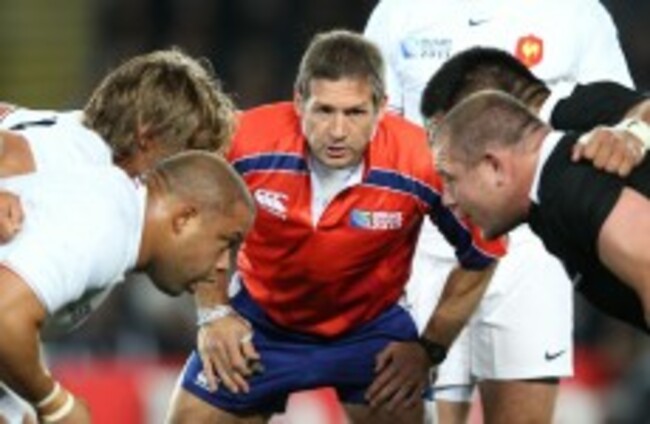AS THE IRISH rugby team get back to normality at home, one Irishman is still very much at the centre of the action in New Zealand: referee Alain Rolland.
The bilingual Dubliner will be the man in the middle in Auckland’s Eden Park on Saturday as France and Wales do battle in the first World Cup semi-final.
Having taken charge of the 2007 final, Rolland is well used to high-pressure occasions. He has already been in action four times at this tournament: for Australia v Italy, Wales v Samoa, New Zealand v France and Argentina v Georgia.
So as he prepares to take centre stage on Saturday, we’ve crunched the numbers on his performance to date and tried to work out what to expect from him in the game’s different problem areas.
Breakdown
Of all the referees at the World Cup, Rolland has awarded the most penalties at the breakdown for tackling infringements (not releasing the ball or tackled player; not rolling away; player leaving their feet).
In total, he’s whistled 53 times in his four games, just three fewer than Craig Joubert who has refereed a game more.
Part of the reason for Rolland’s high penalty count has been a somewhat inconsistent approach at the tackle area. In the first half against Wales, Samoa’s forwards seemed able to go in off their feet with impunity and were very rarely pulled up on it.
Rolland did take a stricter line in the second half of that game, but teams are already struggling to understand each referee’s unique interpretation of the rules and this kind of inconsistency isn’t exactly ideal.
With powerhouses like Thierry Dusautoir and Sam Warburton operating around the breakdown, Rolland will need to set his stall out early on Saturday.
Scrum
In Rolland’s four games so far, there have been 71 scrums, 34 of which have either collapsed or been reset, resulting in a total of 16 penalties. Again, all of those numbers are slightly above the tournament average, indicating that Rolland is stricter than most when it comes pinging infractions in the tight.
Both front rows are hugely experienced at international level and know that perception is everything at the scrum. Watch as they seek to establish themselves as the dominant force in the hope that any of Rolland’s marginal decisions will benefit them.
Discipline
Here’s one for you stats nerds. Rolland is the only referee yet to produce either a yellow or a red card at this year’s World Cup.
While that’s an interesting nugget in itself, it is also a key indicator of his refereeing style. Among his large number of penalties are 13 “disciplinary” infractions that are often deemed worthy of a yellow card e.g. for a high tackle or collapsing a maul. Rather than immediately banish offenders to the sin-bin, Rolland has preferred to give them a strong warning and one last chance.
With the tournament now down to the final four, will he be tempted to take a stricter line on Saturday?
Tries
Rolland’s four matches have been largely free of controversy, which is almost certainly part of the reason for his appointment on Saturday. But there were at least two occasions on which his decisions have sparked discussion, if not debate.
Samoa certainly felt hard done by in their game against Wales when flanker Maurie Faasavalu had a first-half try disallowed for a double movement. The call was a marginal one yet Rolland ignored the pleas of Samoan captain Mahonri Schwalger to refer the decision upstairs to the TMO. He may have been comfortable that his decision was correct one but it was strange that he didn’t take 30 seconds to verify the decision given its potential impact on a tight game.
The other decision was much less important, coming long after New Zealand had secured their bonus-point victory over France.
Rolland allowed the French to take a quick tap penalty close to the All Blacks’ line late on, resulting in a try for Francois Trinh-Duc. As the penalty was being taken, Rolland had finished talking to Tony Woodcock and Richie McCaw — but only just. What’s more, he had yet to get out of the way and would’ve certainly hindered any tackle had the All Blacks’ defenders not been so asleep.
The decision had no real impact on the game or the tournament, but it remains another interesting example of his borderline calls.




